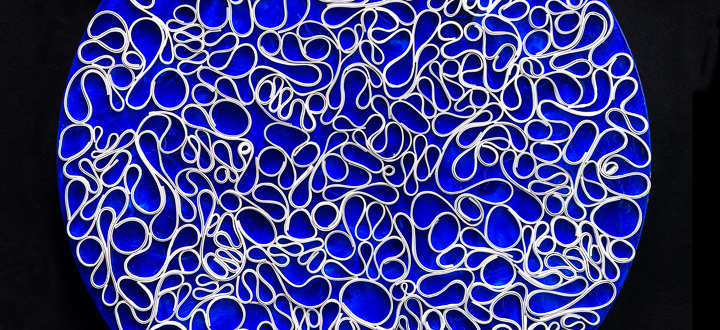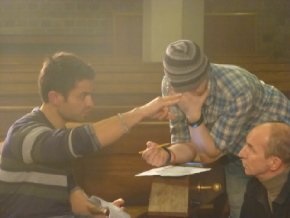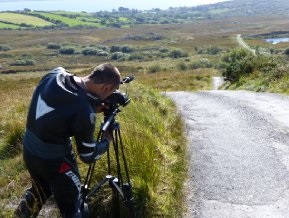

Almost in defiance of the impending gloom of Brexit, London continues to host a plethora of European film events, national film-weeks and a variety of cultural cinematic gatherings, screenings and mini-festivals, sometimes on Embassy premises or in other non-cinema venues. Currently, on one of the capital's smartest streets in merry Marylebone, and more or less opposite the ever-busy entrance to one of London's film-starriest hostelries, the Chiltern Firehouse, is a most unusual, tiny temple to the seventh art. Curiously disguised as a barber shop, with jaunty red-and-white striped awning is The Gallery of Everything, at the south end of Chiltern Street W1., the earthly abode of the pioneering British arts charity The Museum of Everything.The building is described as London's first and only commercial space dedicated to non-academic and private art-making.Since 26th March (and until 18th June, 2017) it hosts a double exhibition entitled ACTION,CAMERA! which pairs camera creations by Australian salvagiste Alan Constable (ceramic revisions of lenses) with the first UK showing of joyous movie collages by Bucurest's Ion Barladeanu, whose colourful cut-outs of "forbidden" stars and probably proscribed foreign movies from the Communist era now seem superbly satiric cinemascoped scenes from the films he was making for himself in his head, juxtaposing political supremos with the likes of Liza Minnelli, Brigitte Bardot, and sundry Bonds.Quite literally discovered after the Fall of the Berlin Wall and the despatch of Ceaucescu, these brightly coloured Panavisions are well worth the pilgrimage now. (Tuesdays to Sundays from 11am). But the best time to savour these cinematic scherzi would be during the weekly season of Iron Curtain Films,lovingly curated by Robert Schilling,a film lecturer who hails from Hunedoara but is now based in London, who has selected five classic Romanian feature films to accompany the exhibition in ticketed screenings on Tuesdays at 7pm.
The season kicked off, on May 4th with the state-funded IACOB, a powerful even Biblical tragedy set in a mining community during the 1930s but clearly sardonically commenting on its time of production and premiere,during the late 1980s (it was a candidate at the European Film Awards in 1988 with Dorel Visan nominated as Best Actor in the title role,and IACOB was also nominated for Best Film), with strong performances from an experienced cast and gorgeous photography of snow-swept mountainous villages contrasting with the grimly regimented underworld of the mines.It shows still the assured direction of Mircea Daneliuc.
As thematic aperitif,a horseradish vodka was served (allegedly of bootleg provenance ) which packed a powerful kick itself, somewhat moderated- as the charming galleryistes kindly suggested-by the munching of fresh red apples.Further to complement a scene from the film, tastily-roasted chicken drumsticks were also freely available.An informative introduction to the film by Robert Schilling complimented this original and literal hors d'oeuvre.
The second film in this captivating season is the 1970 historical epic MICHAEL THE BRAVE (203 minutes) so the mind boggles (or salivates, if such is possible for a mind) as to what will be served up for that, on 9th May 2017, at 7pm. Any remaining tickets may have to be begged, borrowed, or bought.An original and most welcome addition to the London film seen.Noroc si Sanatate!
Phillip Bergson www.gallevery.com
| Attachment | Size |
|---|---|
| https-%2F%2Fcdn.evbuc_.com%2Fimages%2F31066501%2F211289272703%2F1%2Foriginal.jpg | 98.12 KB |
| https-%2F%2Fcdn.evbuc_.com%2Fimages%2F31066501%2F211289272703%2F1%2Foriginal.jpg | 98.12 KB |
 There is another White House, an iconic apartment-house opened in 1936,and now a listed building, in bustling Marylebone, close to Regent's Park in the centre of London, and opposite the site of the Diorama, a fore-runner of cinema, which employed candle-light on huge paintings, with audiences literally moved around a flexible,arena-like space.Adjacent in Albany Street was another celebrated Victorian attraction, the Colosseum, constructed in the 1820s to house "The Panorama of London", the largest painting ever created.
There is another White House, an iconic apartment-house opened in 1936,and now a listed building, in bustling Marylebone, close to Regent's Park in the centre of London, and opposite the site of the Diorama, a fore-runner of cinema, which employed candle-light on huge paintings, with audiences literally moved around a flexible,arena-like space.Adjacent in Albany Street was another celebrated Victorian attraction, the Colosseum, constructed in the 1820s to house "The Panorama of London", the largest painting ever created.
 Last month another vernissage was well-fuelled by Le Dame's usual prosecco for the first UK solo show of American artist Brian Huber, who hails from New Orleans (further justifying the reference to Tennessee Williams in the title to this piece), studied Art and Architecture at the University of Louisiana, worked for television studios and corporations in San Francisco, and lived on a houseboat in Sausalito.A short film shows him creating his most attractive abstract landscapes, inspired by rhythms of jazz and blues (and some very vivid blue colours),sculpting giant sheets of acrylic paint into Braided and Circle Back designs. The exhibition continues until 3rd June 2017 and is well worth the walk down Memory Lane.
Last month another vernissage was well-fuelled by Le Dame's usual prosecco for the first UK solo show of American artist Brian Huber, who hails from New Orleans (further justifying the reference to Tennessee Williams in the title to this piece), studied Art and Architecture at the University of Louisiana, worked for television studios and corporations in San Francisco, and lived on a houseboat in Sausalito.A short film shows him creating his most attractive abstract landscapes, inspired by rhythms of jazz and blues (and some very vivid blue colours),sculpting giant sheets of acrylic paint into Braided and Circle Back designs. The exhibition continues until 3rd June 2017 and is well worth the walk down Memory Lane.












